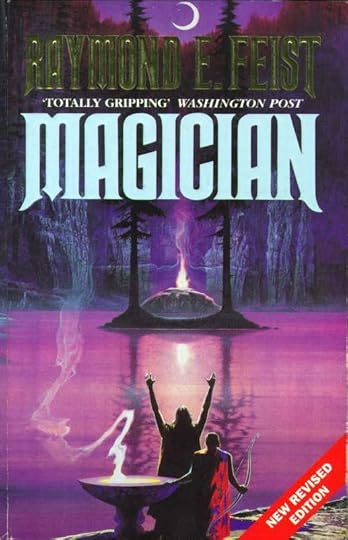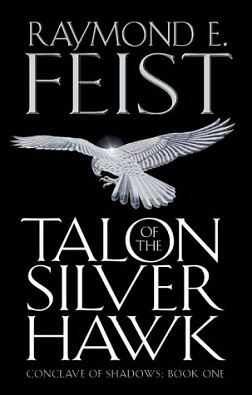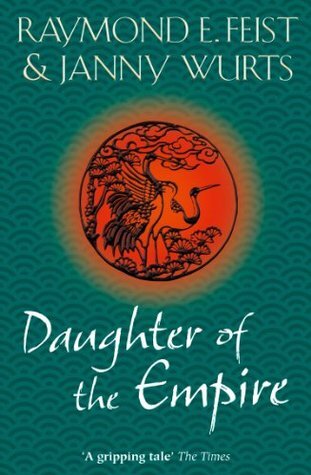The Great Riftwar Re-Read
Some books shape us. Especially when we’re young. There are worlds we travel to as children that never truly leave us. (Not to say that the same isn’t true when you’re an adult, but you know what I mean.) I read a lot when I was a kid; I powered through every scrap of fantasy and SF I could get my hands on. I spent hours in every library within easy reach, especially at my high school,* devouring Tolkien and Pratchett and Iain M. Banks. And dozens of others besides.
But I’m not going to talk about any of those. Because as much as I love all those authors, and as much as they’ve shaped my taste in literature and my writing style (which is a lot), there’s another author who affected me more than any of the rest, thanks first to the generosity of my English teacher, Mr Preston (who gave half his fantasy collection to the school library, including these books), and my dad’s friend Andy (who coincidentally was getting rid of his own fantasy collection, including the very same books).
Raymond E. Feist, and the Riftwar saga: 29 books spanning from 1982 to 2013, and one of the best fantasy universes ever created.
 Luckily enough I had the expanded edition from the beginning.
Luckily enough I had the expanded edition from the beginning.The first Riftwar book, Magician, starts in fairly standard fashion. A young boy discovers he has magical talents in a generally medieval European-style fantasy world, and goes off to become an apprentice while his best friend becomes a soldier. There are castles and wise old wizards and forests of elves. Seems fairly standard for fantasy, right?
Well, that’s when sorcerers from another planet rip a hole in space-time and throw an invading army through it. Those are the Rifts; this is the War. And now the story gets really bloody interesting.
In the first book alone, Feist takes us (meaning impressionable, 11-year-old me) on a journey across two very different worlds experiencing a very violent clash of cultures. The invading world of Kelewan, unlike the European-style Midkemia, is based on Japanese and Chinese cultures, full of grand political intrigue and matters of honour. Also alien insect-people. And back home on Midkemia, there are two factions of elves warring for dominance, and a long-dead race of dragon-riding demigods seizing the opportunity to reincarnate themselves. And there’s an enigmatic sorcerer with far too much knowledge of both worlds pulling the strings from the background.
And this, I will remind you, is all in the first book. The first of 29.
Because the Riftwar saga is a generational thing. Generally focusing on the royal family of one particular kingdom and their various friends and allies, the first trilogy deals with the original protagonists – but then the baton passes to their children in the next pair of books, and to their children in the 4-book Serpentwar, and so on. Feist captures this wonderfully: each set of children is very recognisably influenced by their parents, and you can see the same traits you admired in that original crew being passed down in lesser or greater measure to each subsequent generation. It’s immensely rewarding for a long-term reader too. When you’re reading book 27 and you spot a tavern in the background of a scene that’s named after a character from book 5, for instance, it’s so satisfying.
 One of my favourites – book 19 of 29.
One of my favourites – book 19 of 29.Meanwhile, wizards (and dragon-riding demigods) are largely immortal, and so while the kids deal with the immediate crises of each book, the very same protagonists from the very beginning are handling the big cosmic battles that are raging in the background, first in the original two worlds and then in many, many more. Feist balances all this masterfully. It’s a beautifully rendered universe with so many stories in it, and each internal plotline explores a new facet of it.
The Riftwar is proper epic fantasy. Feist’s style and scope have influenced pretty much everything I’ve ever written to some degree. I started writing my first book when I was about 12, and you can really tell from that original draft who I’ve been reading.
But while I owned most of the series, and I picked up most of the gaps from various libraries, I never actually finished them. I got as far as the first book of the final trilogy in the saga, but then went off to university, where my bookshelf space was alas severely limited and several feet of Riftwar books had to stay behind.
I’ve got lots of bookshelf space now.
I have begun my great re-read of the entire Riftwar saga. I’m starting from the beginning, reading in chronological order, and I’ll pick up the books I’m missing along the way… until finally I get to the end, and have a nice complete collection to boot. I’ll pause for some palate cleansers en route, but this is my main reading project for the next year or so. And as I get through each section (not every book, as I don’t fancy writing 29 reviews of a single series), I’ll review them and stick them up on here. If I convince even a couple of you to read Feist’s work as well, then it’ll all be worth it.
I’ve actually not begun with Magician. Feist and Janny Wurts actually wrote a spinoff, the Empire trilogy, set during the events of Magician but in the cut-throat noble court of Kelewan. It’s all political intrigue and machinations, and I’m thoroughly enjoying it so far – apart from the last two books I never got to and one other spinoff, they’re the only books in the series I’ve never read at all.
 This is such a long-running series that there’s no hope whatsoever of me having a matching set of covers.
This is such a long-running series that there’s no hope whatsoever of me having a matching set of covers.The Riftwar made me the reader, and the writer, I am today. Diving back into Feist’s world after so long is a wonderful experience. I hope you’re intrigued by the concept… because I’m going to be talking about this a lot.
What books shaped you?
*That’s secondary school, i.e. 11-16, for those of you across the Pond.



